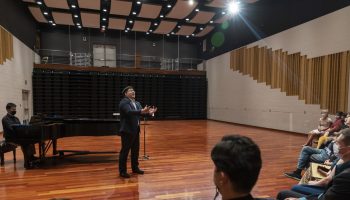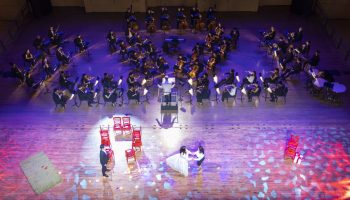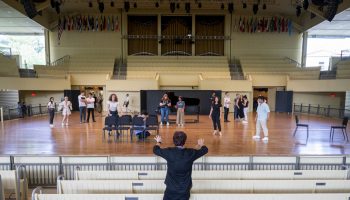Chautauqua Institution is a “gold mine” for young artists.
“The possibilities are endless, and the sky’s the limit,” said Vartan Gabrielian, a vocal student returning for a recital. “And the best part is, whatever you do, you know that people will always support it and be a part of it.”
Gabrielian will be performing Franz Schubert’s Schwanengesang along with 11 voice students as part of a student recital at 7 p.m. Sunday in Fletcher Music Hall. Gabrielian will be joined by Nate Raskin, who will be a pianist/coach with the Metropolitan Opera House for the 2017-18 season as part of the Lindemann Young Artists Development Program.
The Schwanengesang is the collection of songs that Schubert wrote at the end of his life. Gabrielian said they’re darker and gloomier than most songs in Schubert’s repertoire, which he’s working to portray in his performance.
The Schwanengesang doesn’t have a storyline like most song cycles. Instead, Gabrielian said the songs are bound together through shared themes of lost love, emptiness and the purpose of life.
“It’s complex; you can study if for a while because there’s so much to look at,” Gabrielian said.
In addition to the emotional depth of the pieces, the Schwanengesang is also known for its complex technique. Gabrielian said the song cycle is vocally challenging because it uses the voice’s entire expanse.
When performing difficult pieces like in Sunday’s performance, Gabrielian is appreciative of the well-informed Chautauqua audience.
“Most of them at one point or another have been in choirs or orchestras,” he said. “They know the extremity you’re pushing your voice to and the difficulty of what you’re trying to achieve. They’re more understanding of you.”
Gabrielian said uninformed audiences can be ruthless because they have nothing on which to base their opinion. He said they often expect vocalists to be “superhuman,” but inevitably vocalists aren’t going to sound the same every day when “the instrument is in you.”
Marlena Malas, chair of Chautauqua’s Voice Program, said it takes 20 years to fully develop a vocal technique. Malas has been working with Gabrielian for four years and said she’s looking forward to his performance on Sunday.
“He’s made unbelievable progression in his voice and maturity,” Malas said. “(He) has quite an extraordinary voice that is beguiling and mature for his age. Sometimes it’s a bit bewildering because he is still quite young.”
Gabrielian is thankful for teachers like Malas who put “continuous blind trust” in the young artists.
“They are able to identify a young person’s talent and see what it becomes,” he said. “In the end, what the potential becomes is up to the young person themself. They get it rolling and what you do with it is up to you.”




